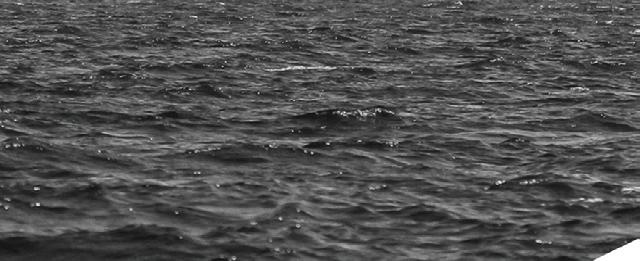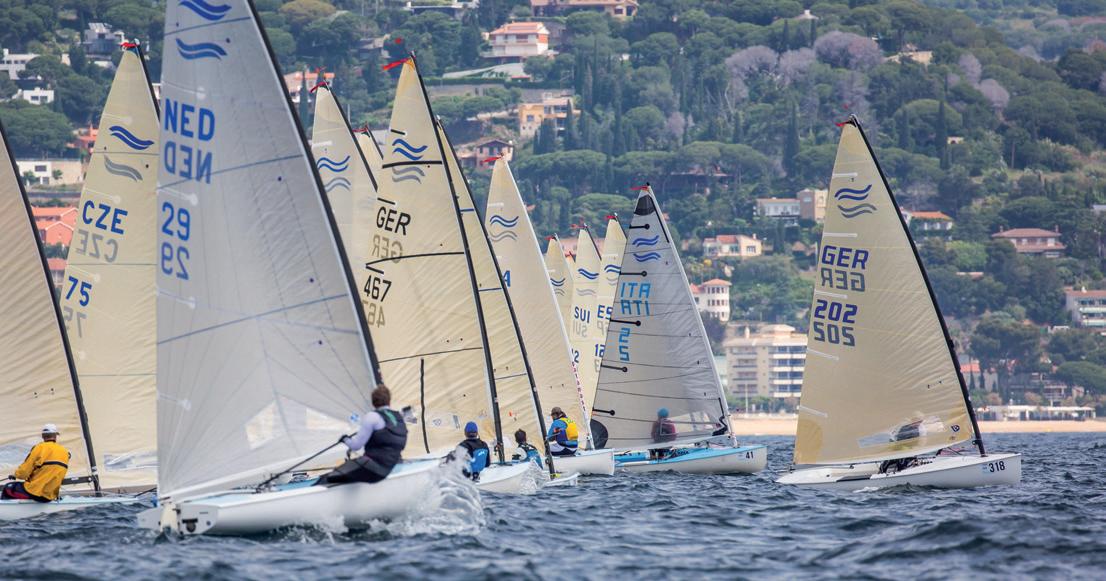
6 minute read
Rolf Elsässer Interview
WE ARE ON THE RIGHT TRACK

Advertisement
It started in a Pirat dinghy.
“My parents bought a dinghy, a Pirat (a German national class), in the year of my birth and I was always included when they went out sailing. Later we had a small keelboat, located on Lake Constance. After my parents stopped sailing and the boats were sold, I also stopped sailing and started competitive skiing and worked as a ski trainer.”
“A parent of one of my students, who was a sailor, took me to a regatta. It was great fun, and some weeks later I started to look for a dinghy. In order to be flexible it had to be singlehanded with regattas within easy reach and without long journeys. The answer was a Finn. I bought a used one, which turned out later to be non-compliant, without any idea how to sail such kind of a boat. But I learned fast, on and in the water.”
“This happened in 1981 when I turned 30. I like competitive singlehanded sailing with friends at interesting locations. Since you sail alone, it’s always your fault.”
The Finn Masters has special importance. “I like the international atmosphere, the very competitive races, the friendships with Finn sailors from all over the world, and not least enjoying some drinks with friends from all over the world after a nice day on the water.”
He also enjoys yacht racing.
“Yacht sailing is always a pleasure. I have enjoyed trips with friends in the Mediterranean and the Baltic Sea. Once I crossed the Atlantic, which was a very special experience. I like short races, cruising along a coast, and to see very different landscapes and places.”
Rolf cannot remember how many Masters he has competed in but thinks it is around 20, since his first in La Rochelle, in 1996.
“I can remember almost all of them, but it is hard to identify the best memory. I remember every Masters for something awesome. La Rochelle in 1996 was my first Masters, first time on the Atlantic and with an impressively enormous tide. Kingston, Canada, in 2001, was the smallest fleet ever. In Barbados, sailing in the Caribbean Sea with sea turtles and flying fishes, in huge waves and strong winds are probably the most impressionable memories. Sopot and La Rochelle were challenging, and the friendliest atmosphere was in Kavala, and so on. For any venue I can remember something special.”
COMMITTEE
The Masters Committee was founded in 2004 to assist the President as the event started to outgrow its original size. As well as Rolf, it consisted of Rolf Lehnert as President, David Branch, Mike Till, Jean Paul Gaston, Jiri Outrata and Henk de Jager. “In the beginning the Masters were more or less a kind of fun regatta. Friends decided to have racing and fun in the sun. But the fleet became bigger and bigger and it was obvious that we had to take the organisation to another level.” “At the Annual Masters Meeting that year, the audience were asked for volunteers to join the committee. By chance I was sitting in first row, and the German Finn President, Friedrich Müller, sitting beside me, dragged me on stage, to be elected. We started almost from scratch, and developed
AFinn sailor since 1981, Rolf Elsässer has been on the Masters Committee since it was first instigated in 2004. He has seen three Masters Presidents come and go, so has a unique perspective of the Finn Masters. Though he started sailing at birth, after a gap of some years he came back to the sport at age 30.

rules and regulations to bring the organisation to a level adequate for the increased number of sailors and the expected professionalism. Now we are, depending on the location, at about 300 competitors and we are facing new requirements regarding finding suitable locations, race organisation on shore and on the water in different groups.”
DEVELOPMENT
“I see it as a development from an ‘amateur/fun’ level with small fleets, via a transition phase, where rules and regulations have been developed, into a professional organisation running fleets of more than 300 individuals. And, by the way, you have to consider singlehanded sailors, especially Finn sailors, are special individuals, and act as such. To get everything in line, you need a strong and professional organisation, which is what we have at present.”
Before 2004, “The organisation was in the hands of Lilo and Rolf Lehnert and it worked well, since the fleets were small and everyone knew each other. Due to the small fleets it was easy for the organisation and the yacht clubs to manage accommodation and the races on the water and on land.”
Rolf has sat under three Masters Presidents. In 2008, in Medemblik, Fons van Gent was elected as Masters President.
“With Fons the task was installing an organisation and developing rules that apply for the organisers both on shore and for the racing on the water. It involved some great teamwork. We got input from sailors such as Richard Hart and Walter May, who were familiar with all relevant regulations about sailing, which was very helpful. Based on this, Andy and his team have optimised the rules and regulations and with others, developed systems that allow fair sailing in different groups. In my experience this is the toughest job, because everybody else knows better… Additionally the tasks become more international. The Finn Europeans now also comes under the umbrella of the organisation, no love match, but gives us the possibility to have the World Masters outside Europe and on a different date. Whitsun can be used for the Europeans.”
The level of growth in the Masters has surprised him.
“Years ago I thought the amount of competitors would decline, since the old sailors would stop sailing and we do not have many ‘leisure’ Finn sailors in their 30s, especially in Germany. But I was wrong. We now see a lot of very good sailors coming from different classes who are tired of searching for a crew now enjoying singlehanded sailing. In addition, because of their good organisation and the professionalism, Finn sailors, once successful, are interested in participating. The Finn is still an Olympic class, but we do not know what will happen, if the Olympic Committee will decide differently. A well organised FWM is one of the best promotions for the class.”
NEW IDEAS
“So I think we are on the right track, but like everything, there is always something that can be improved. With new people new ideas will come.”
He is adamant that the event should go outside Europe more often.
“We should not stay in central Europe. The name is Finn World Masters, so every now and then we should go outside Europe. Now that we have the European Masters as well, this allows us to go overseas without leaving the Europeans who do not want to travel, without a major event.” “For me the size of the fleet is less important. I can understand everybody who doesn’t like to travel long distances, but in future we must be creative in finding smart logistics to get the boats to the regatta and back cheaply and easily.” After 13 years on the Masters Committee he will hand over to Andreas Bollongino at the 2021 AMM in Medemblik. “After the AGM, Andreas ‘Bollo’ Bollongino will be my successor in the Masters Committee. I think most of us know him well. He is a very good sailor, knows a lot of everything about sailing (and others), is fluent in English, and always has a joke on his lips. I am sure he will be a valuable and creative member of the Committee. Last not least, since last year he is the Vice-President of the German Finn Class Association.”

leFt: in el Balis in 2018
aBove: in torBole in 2016 (Photo Michael kurtz) Below: in torBole (Photo Berit hainoja)







